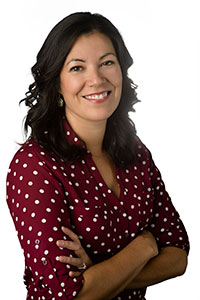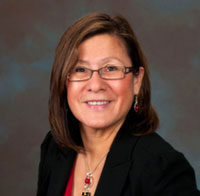News and Updates
Contact
Faculty of Social Science
Social Science Centre
Room 9438
Western University
T. 519-661-2053
F. 519-661-3868
E. social-science@uwo.ca
Toward a new understanding of Indigenous Health
July 16, 2018“Academics can’t just do research on Indigenous communities; they have to do research with Indigenous communities.” For Chantelle Richmond, Associate Professor in the Department of Geography, it is time for Indigenous health research to fundamentally change.
For Chantelle Richmond, Associate Professor in the Department of Geography, it is time for Indigenous health research to fundamentally change.
Richmond is the newly named Canada Research Chair in Indigenous Health and the Environment. She is part of a growing movement of academics and Indigenous community members who feel that much of the research involving Indigenous communities is too narrowly focused, and does not take into consideration the deeper and more complex situations facing many communities.
In July, Richmond will be joined in the Department by Diana Lewis, who will also teach courses in the First Nations Studies program. Lewis is coming from Dalhousie University, where she was the inaugural coordinator of, and lecturer in, the Indigenous Studies Program.
Lewis’ PhD research focuses on resource development, and the impacts of resource development on the health of Indigenous peoples, using a methodology that combines both Indigenous and western-based sciences. Lewis researches issues of bio-politics and bio-power, or when and how the state controls the narrative around groups of people. She is also working with Indigenous communities to counter those narratives.
Lewis researches issues of bio-politics and bio-power, or when and how the state controls the narrative around groups of people. She is also working with Indigenous communities to counter those narratives.
“A community based approach is important when doing research with Indigenous communities,” said Lewis. “It allows communities to be equal partners in what the research questions are, so the research is more relevant to their needs.”
“Research focused on Indigenous health is growing, but so are inequities. So why is this?” asked Richmond.
In January, Richmond was also part of the launch of the Indigenous Mentorship Network Program of Ontario, which includes 13 research institutions and a team of 70 researchers, trainees and community collaborators.
The program represents a fundamental reorientation in how health research takes place in First Nations communities, said Richmond, who serves as the Network’s program leader.
“For the first time, we are connecting the networks of the Indigenous community with the networks of academia,” said Richmond. “We are putting communities in the driver’s seat on health research that matters to them.”
When researching health, for instance, researchers often focus on narrow areas such as disease burden or behaviours, without considering the other issues that may determine the health and situation of Indigenous people. This could include reverberations and continued effects of the Indian Residential schools, lack of healthy food options, and lack of continued and appropriate access to health care.
Researchers may also view issues from a biomedical perspective “that too often forces dichotomies of health and well-being,” said Richmond, not giving proper consideration to Indigenous knowledge and Indigenous approaches to health, which generally consider health on a continuum of wellness.
Richmond’s CRC will build on the concept of relational accountability to examine the processes that both support and constrain relationship building in Indigenous health research. Richmond will consider how to help bridge gaps that may occur as partners view the world through different experiences and philosophies. This includes Indigenous and non-Indigenous worldviews, but, as many of the problems are multi-faceted, it also includes bringing together researchers from different fields to share
knowledge.
“Sometimes we are coming from different worlds and perspectives,” said Richmond. “How do we overcome that?” The change, Richmond says, has to happen with academics, and trainees, connecting them with community members.
Changing the approach can have an impact beyond research. “If we can have better understanding of the different ways of knowing, we can better move toward reconciliation,” said Richmond.
Lewis is focused on providing communities with the opportunity to collect and control their own health data.
For the past seven years, her research has focused on the impacts that a pulp and paper mill has been having on the health of Pictou Landing First Nation. Government has never investigated the health concerns of the community, despite the community being exposed to contaminants for 50 years. The community had no baseline health data to evidence how the community has been impacted over the years.
Together, with the women of the community, Lewis developed an environmental health survey to collect data for the community, using a methodology guided by the principle of Etuaptmumk, or Two-Eyed Seeing, which calls upon researchers to approach research using Indigenous knowledge and Western knowledge, drawing upon the strength of both approaches.
“Now they have their own data, which belongs to the community, to show how their health has been impacted,” said Lewis.
“Despite an increase in research on Indigenous topics in Canada, inequities are growing and outcomes are not improving,” Richmond said. “The only way to change that landscape is to work with the community, through diverse, interdisciplinary teams of trainees who know intimately the landscape of the communities.”
“When you restrict research to a Western perspective, it can’t go deep enough to get to the Indigenous worldview,” said Lewis. “A community-based approach can honour an Indigenous methodology, and gives you space to bring in how Indigenous people relate to the land and environment around them”.
“The relationship to the land and environment is sacred, and when it is severed, it is traumatizing,” said Lewis. “I am, in part, using quantitative analysis to demonstrate the strength of that relationship.”
“What’s needed is to recognize that health is infused with cultural, social, political, geographic and environmental context,“ Richmond said. “Studying Indigenous health must then include a deep understanding of traditional knowledge about the land and the people’s place in it.“
“The University is focused on what it does well, but if it wants to make big changes, we have to re-think our approach to the topics,” said Richmond. “Indigenous research can no longer be a theoretical exercise; we must do research that will not only ensure real impact in the communities we work with, but it should also bring communities closer to their goals of self-determination.”
“The answers will not come merely from doing more (or spending more on) research,” said Richmond, “but will be realized through a fundamental reorientation of how we do research.”
Chantelle Richmond’s CRC will connect and expand upon three projects Richmond is already working on: the Interdisciplinary Development Initiative on Applied Indigenous Scholarship, which focuses on the academic environment; the Indigenous Mentorship Network Program of Ontario, which focuses on health training environments; and an international SSHRC Insight Grant, which focuses on global Indigenous connections with the land.
The Ontario-based network aligns with the other seven provincial nodes of the Indigenous Mentorship Network Program, which is funded by the Canadian Institute for Health Research. The network will provide researchers with well-supported training opportunities and environments for community-based learning and research. It will offer scholarships, seed grants, webinars, research innovation and publishing opportunities to trainees, postdoctoral fellows and new investigators.
Hundreds of young researchers will receive training through the program.
It will operate from Western on funding of $1 million from the Canadian Institute for Health Research (CIHR) and $1.2 million from other partners during the next five years.

